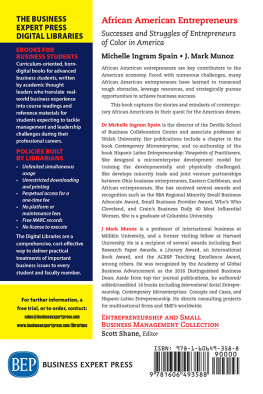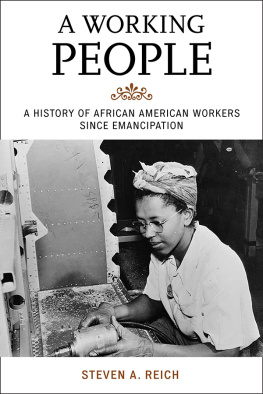
African American Entrepreneurs
African American Entrepreneurs
Successes and Struggles of Entrepreneurs of Color in America
Michelle Ingram Spain and J. Mark Munoz

African American Entrepreneurs: Successes and Struggles of Entrepreneurs of Color in America
Copyright Business Expert Press, LLC, 2018.
All rights reserved. No part of this publication may be reproduced, stored in a retrieval system, or transmitted in any form or by any meanselectronic, mechanical, photocopy, recording, or any other except for brief quotations, not to exceed 400 words, without the prior permission of the publisher.
First published in 2018 by
Business Expert Press, LLC
222 East 46th Street, New York, NY 10017
www.businessexpertpress.com
ISBN-13: 978-1-60649-358-8 (paperback)
ISBN-13: 978-1-60649-359-5 (e-book)
Business Expert Press Entrepreneurship and Small Business Management Collection
Collection ISSN: 1946-5653 (print)
Collection ISSN: 1946-5661 (electronic)
Cover and interior design by Exeter Premedia Services Private Ltd., Chennai, India
First edition: 2018
10 9 8 7 6 5 4 3 2 1
Printed in the United States of America.
Abstract
African American entrepreneurs are key contributors to the American economy. Faced with numerous challenges, many African American entrepreneurs have learned to transcend tough obstacles, leverage resources, and strategically pursue opportunities to achieve business success. This book captures the stories and mindsets of contemporary African Americans in their quest for the American dream.
Keywords
African American entrepreneurship, entrepreneurship, minority entrepreneurship
Contents
According to Websters dictionary, an entrepreneur is a person who organizes, manages, and assumes the risks of a business enterprise. In 1986, Peter Drucker defined entrepreneurship as the process of gathering and allocating the financial, creative, managerial, or technological resources necessary for a new ventures success. Bygrave (1997) went further, stating that it is the essence of any free enterprise for the birth of a new business to give a market economy its vitality. Brodsky (1996) expanded the definition to: Starting with nothing more than an idea or a prototype, entrepreneurs can take a business to the point at which it can sustain itself on an internally generated cash flow. According to Murphy (2014), a columnist for Inc. Magazine, Harvard University teaches a 12-word definition of an entrepreneur, Entrepreneurship is the pursuit of opportunity without regard to resources currently controlled. Additionally, positive mindset is crucial since it can impact venture viability (Huang and Pearce 2015). The network of threads constructed to support an idea, organize, manage, a calculated risk by the African American entrepreneur when compared is similar. Some instinctively learned from the calculated risk they assumed when starting a business others did not. Some developed the skill necessary to succeed; others did not. The authors define the entrepreneur as the individual with an innate survival instinct willing to learn, adapt, and apply the skills they learn through observation and reflection, not the classroom.
The entrepreneurs ancestors, upon whom this book focuses, entered America as unwilling immigrants. There is a full breadth of cultural practices, beliefs, and value systems that dominate African American entrepreneurship in America that began during slavery. They developed an ability to assume calculated risk, apply just -in time strategies and knowledge to gather and distribute resources during slavery. During slavery and post-slavery, their entrepreneurial experiences are unique. They did not control resources, yet, they pursued opportunities. They generated economic vitality in the African American community and made enough cash flow to their businesses to make a difference in the quality of their lifestyle and the economic sustainability of the African American community.
The range of facts and assumptions about African Americans often send situational cues to African American entrepreneurs signaling awareness, knowledge, and problem-solving strategies. One way of trying to embrace the various facts and assumptions that drive the African American businessmens experience is to write about the owners shared experiences and viewpoints. This includes the links to their backgrounds, social histories, success or failure, as well as the pursuit of opportunities with scarce resources.
In a perfectly uniformed entrepreneurial world, all entrepreneurs would not be alike. Race, gender, ethnicity, social learning history, emotional intelligence, social capital transactions, access to opportunities and resources would cause imbalance. It is easy for many to attribute race as the primary throttle that divides entrepreneurial uniformity. The racebased public laws, executive orders, regulations, and requirements often increase or decrease the opportunities for African American entrepreneurs.
In this book, the authors explore the experiences of the African American business owner, who is the principal in various small business initiatives, industries, and geographic locations. They link his/her business to the race-based throttle controlled by state and local public laws, executive orders, regulations, and requirements for doing business as an African American business owner regardless of gender. This throttle controls the playing fields, and the designated business zones in which African American entrepreneurs do business. If the business owner elects to take advantage of self-employment opportunities, supportive services, and resources, such as access to capital, insurance and bonding, business support services, projects and procurement opportunity options controlled by mainstream America, they conduct their business in the designated zone.
In the book, African American entrepreneurs discuss how entrepreneurship, for them, is a transected process driven by assumptions about their race.
There are several reasons why the authors wrote this book. Entrepreneurship, as a topic embraced by the American educational system, is the newest subject in the academic curriculum in universities as well as grades K thru 12. According to Carl J. Schramm (Entrepreneurship in Higher Education 2017), Kauffman Foundation President and CEO: Like philosophy or music, entrepreneurship is a field of study that generatesrather than discovers or encounters its subject matter. Unlike history, sociology, or anthropology, for instance, entrepreneurship creates what it studies.
Entrepreneurship in the urban and rural communities accelerates economic change and sustainability. As a result, state and local governments, nonprofit economic development organizations and foundations, and higher education institutions are focusing on venture development and innovation as an economic sustainability and community transformation tool in urban and rural communities. Public Laws and executive orders are executed to ensure African American and other ethnic minority business owners receive equal access to assistance and support services and opportunities for their businesses. Political, social, economic development transformations in mainstream America forced African American entrepreneurs to develop their own strategies, for the inclusion of minority and women-owned businesses in local and national levels. These entrepreneurs sought economic betterment and pursued new venture opportunities typically in the small and medium sized business categories.
Next page












